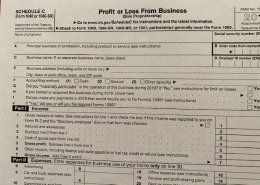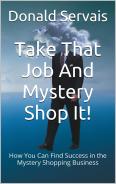Schedule C Tax Form
The Schedule C tax form is where you enter your specific deductions for your business. Parts 2 and 4 of the form is where the majority of the write-offs will come for mystery shoppers. Part 1 is where you enter the totals of your income and write-offs. Make sure to look over this form to become familiar with what you can and cannot write off.
If you make any money from mystery shopping, it needs to be reported on the Schedule C tax form. If you make more than $ 600 with any mystery shopping company, you will receive a form 1099 from that company by January of the following year.
Part 2 of the tax form is the place for the individual expenses for the business use of your home. These expenses include anything for the office, rent or lease of vehicles, travel and meals, commissions and fees, and other items.
Part 4 is where you will list your mileage. You have two options for that. Part 5 is for other expenses that are not included in Part 2, but still considered tax a write-off.
You want to make money when you operate a mystery shopping business. However, if you do a lot of restaurant assignments, you could show a loss overall. That's not always a bad thing. Some people prefer to take a loss to get into a lower tax bracket. You can be reimbursed for meals during the year and pay the IRS a little less tax in the process. Consider that a win-win.
Deducting Mileage on Schedule C Tax Form
The majority of the tax write-offs I've had over the years have been for the miles I drive from one assignment to another. I've had assignments where I traveled four miles round trip. Other times, I traveled over 100 miles.

Many mystery shoppers schedule a bunch of assignments out of town and deduct hundreds and (sometimes) thousands of miles. These mystery shoppers are called route shoppers. Mystery shopping companies like working with these people. Not only can they do multiple assignments, they can also do assignments that may be in a small town that is hard to find a mystery shopper.
You have two options for writing off your miles traveled - standard deduction or actual expenses.
The standard deduction is probably the easiest option. You take the total amount of business miles traveled throughout the year and multiply it by the amount listed on the Schedule C tax form. For tax year 2020, that amount was $ .58 per mile. If you traveled 1000 miles for your business assignments for the entire year, you can write off $ 580 on Schedule C tax form. This amount will be added to your tolls and parking fees.
If you choose deducting actual expenses, you need to keep receipts for gasoline stops, oil changes, auto repairs, insurance and other expenses on your car. Once those are added up, you can show depreciation on the line specific on the Schedule C tax form. There is another line for rent and lease payments.
When you use actual expenses for your deductions, you'll have more receipts to collect and items to add up. However, you probably will have a bigger deduction to record on your Schedule C tax form.
Learn about the legality of mystery shopping.
Travel, Restaurants and Other Expenses
Some mystery shoppers travel to many different cities over a period of a few days or more. Items that you can write off include meals, hotels and a rental car (if you use one).
If you travel away from home, you can write off a meal that you take before or after an assignment within reason. If you travel 2 miles away for an assignment, writing off a meal would be impractical. However, this is meant for people who do multiple assignments. You can stop to get a meal and write that off on your Schedule C tax form.
Keep in mind that while it is a tax write-off, it is not meant to order any meals that are lavish or extravagant.
Restaurant mystery shopping assignments require you to spend your own money while on location or ordering online. You will get reimbursed for your meal, which includes tax, tip and valet service (if applicable) with a report that is accepted by the mystery shopping company.
Reimbursements are not tax deductible
If you are reimbursed any money for an assignment, you will not be able to write that off on your taxes. I've done many grocery store assignments where I was paid $ 10 for a shopper fee and reimbursed up to $ 10 on store purchases. You can spend $ 10 or $ 200 on groceries if you want. However, the only items that are tax deductible expenses are the shopper fee and the miles you drive to the location. You will not be able to write off the entire bill.
Make sure to look over the Schedule C tax form to become familiar with what you can write off. You may get some ideas before you get started. Also, I always suggest you talk to an income tax professional if you have any further questions.
Always Looking for New Shoppers

The mystery shopping business is always looking for new faces to visit different places. If you have some spare time and would like to make some money (or find a lot of deductions), my book has the step-by-step process to get a mystery shopping business started. The book is called "Take That Job and Mystery Shop It!"
- Home
- Income Tax Deductions
- Schedule C Tax Form
